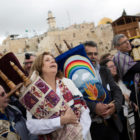
I was getting coffee, just a few hours before Simchat Torah, when I ran into our keyboard player. He was going to be playing at services that evening, as part of our band.
“Do you think that we will get many people at services this evening?” he asked.
“I don’t know. Hard to tell. People are kind of ‘serviced out,’ I think.”
Then, he said something to me that really hit home.
“This evening is going to be joyous, right? Jews don’t do joyous.”
Whoa.
It turned out that we had a nice crowd for Simchat Torah. But, still…
Was he correct?
Let’s think about this. The most crowded services of the year, synagogue speaking, are also the most solemn. I am talking about Yom Kippur, and in particular, the yizkor memorial service.
So, too, during the rest of the year.
Yom HaShoah (Holocaust memorial day): a sad occasion. People come.
Yom HaAtzmaut (Israel independence day): a joyous occasion. Not so much.
True: the last eighty years — since Kristallnacht, actually — has been filled with sadness and pain.
It is enough to testify to the veracity of the old joke, which defines a Jewish holiday as “they hated us, they tried to kill us, we won, let’s eat.”
Is it possible that the Jews suffer from perpetual PTSD?
Perhaps it is mostly a problem with non-Orthodox Jews. I think there is something to this. It is almost as if the more “modern” Jews get, the less they want to have access to their emotions.
Or, at least, absolute joy.
So, how “should” Jews feel — at any given time?
Here is your guide to the Jewish year — emotionally speaking.
My list of possible emotions: glad, sad, mad, scared, bored, and numb.
- Rosh HaShanah: glad. Glad to have made it through another year. Though my preferred greeting is not “happy New Year” (that’s a December 31 thing to say); it is “have a good and sweet year.”
- Yom Kippur: scared. Scared of having the book of life open before us. Scared of looking inward. Scared of seeing ourselves the way God sees us. But, the whole day is not like that. Yizkor is sad. Neilah, the final service, is glad — pure, unadulterated joy….which brings us to:
- Sukkot: glad. It’s zman simchateinu — the time of our rejoicing. (OK, maybe a little sad, as well. In many climes, summer is gone, the leaves are starting to turn, and you are starting to wonder where the snow blower is.)
- Shemini Atzeret. What is that festival, anyway? Numb? Luckily, Israeli Jews and Reform Jews combine it with…
- Simchat Torah: glad. Total, unmitigated glad.
- The whole month of Heshvan, which starts about a week after Simchat Torah. A month with no holidays. Its other name is Marheshvan, “bitter” Heshvan — bitter because it is the only month without a holiday. OK, so Heshvan itself is mad. While the rest of us are probably bored. Get over it. Heshvan teaches us that most of life is not filled with specialness, that there is a sanctity in simply experiencing the everyday and the mundane.
- Hanukah. Glad. Judaism survived the Hellenists!
- Tu B’Shevat: OK, maybe it’s just me. Maybe it’s because I never had a green thumb. Maybe it’s because I tend to forget to water plants, which makes me sad. I feel guilty saying this, but I never got into this holiday. So, for me, it’s numb. Your Jewish mileage might differ. Let’s hope so.
- Purim: glad. We defeated Haman. And we get to drink so much that we cannot tell the difference between Haman and Mordecai. We drink wine. Or, other alcoholic beverages. I like beer. I have always liked beer.
- Pesach: glad. Mostly. The death of the Egyptians, though: sad.
- Yom HaShoah: mad. Real mad. At the Nazis, at their collaborators, at American Jewish leaders who failed to heed the sirens of warning — even at God.
- Yom HaAtzmaut: glad. Real glad.
- Shavuot: glad. Torah can fill us with joy.
- Tisha B’Av: sad. The Temple has been destroyed. The Jews are in exile. Though, to be fair, there is a counter-opinion: glad — that the Jews can now re-build Judaism out of their own creativity, and that they can bring their message to the entire world.
There you have it — the Jewish calendar as a guide to the emotions.
Have a good year — and feel good about doing so.
